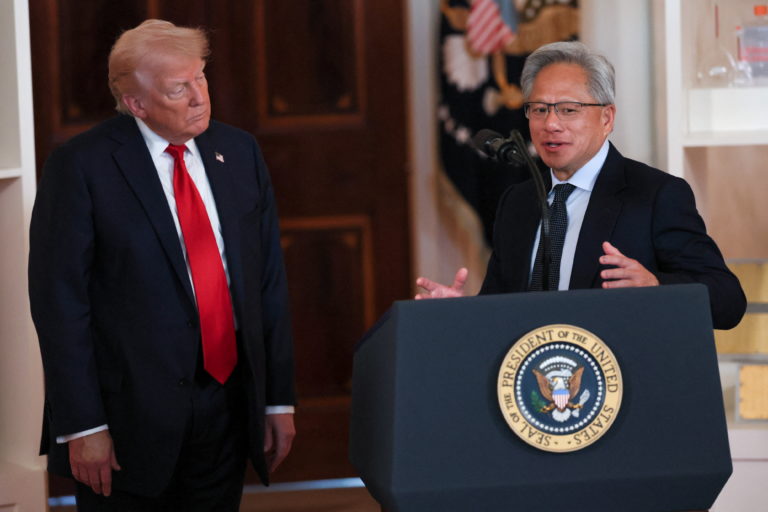Trump Demands 20% Cut from Nvidia for China Chip Sales, Labels H20 Chip ‘Obsolete’
Trump Demands 20% Cut from Nvidia for China Chip Sales, Labels H20 Chip ‘Obsolete’
By
Leah Rosenfeld
Last updated:
August 12, 2025
First Published:
August 12, 2025

Photo: PBS
Trump Reveals Licensing Deal with Nvidia for China Chip Exports, Criticizes H20 Chip as Outdated
President Donald Trump confirmed on Monday that he initially sought a 20% cut from Nvidia’s sales of AI chips to China as a condition for granting export licenses. After negotiations with Nvidia CEO Jensen Huang, the percentage was reduced to 15%. This licensing agreement allows Nvidia to resume selling its H20 chips to Chinese companies, following U.S. export control restrictions.
At a Washington, D.C. news conference, Trump emphasized, “I said, ‘listen, I want 20% if I’m going to approve this for you, for the country,’” highlighting the administration’s intent to leverage chip exports for national benefit.
Trump further criticized Nvidia’s H20 chip, describing it as “essentially an old chip” that is “obsolete” and similar to technology already possessed by Chinese firms like Huawei. He drew a sharp contrast with Nvidia’s latest AI chip, the Blackwell, calling it “super-duper advanced” and stating he would not approve its export to China unless it was significantly downgraded by 30% to 50% in performance.
“The Blackwell is the latest and greatest in the world. Nobody has it. They won’t have it for five years,” Trump remarked, underscoring concerns that advanced U.S. AI technology could accelerate China’s capabilities, posing a national security risk.
Background on U.S. Export Controls and Nvidia’s Chips
The U.S. government introduced export controls on advanced AI chips in 2023 to prevent China from gaining access to cutting-edge technology. Nvidia’s H20 chip is a version modified specifically for China, with reduced performance compared to the H100 and H200 chips used domestically in the U.S.
Nvidia CEO Jensen Huang previously warned that these restrictions “effectively closed” the Chinese market for Nvidia’s H20 chip. The company had anticipated approximately $8 billion in H20 chip sales during the July quarter before exports were halted.
An Nvidia spokesperson told CNBC, “While we haven’t shipped H20 to China for months, we hope export control rules will let America compete in China and worldwide.”
Future Negotiations and Broader Industry Impact
Trump also revealed that Huang plans to meet with him again to discuss export licenses for Nvidia’s more advanced Blackwell chips. The administration’s approach aims to balance protecting U.S. technological leadership with maintaining a competitive edge in the global AI market.
Additionally, a White House official confirmed that Advanced Micro Devices (AMD), Nvidia’s main competitor, will also pay a 15% fee to export its China-specific AI chip, the Instinct MI308.
Industry and Security Implications
The U.S. fears that exporting advanced AI chips to China could enable Beijing to surpass American advances in artificial intelligence, with potential implications for national security and economic leadership. Trump’s comments reflect ongoing tensions over technology transfer amid a broader U.S.-China rivalry in the semiconductor sector.
Huang has argued that allowing Chinese AI developers access to U.S. technology actually strengthens U.S. national security by fostering dependence on American tech, rather than pushing China to develop its own chips more rapidly.
Popular articles
Subscribe to unlock premium content
Merch, Meals, and Memories

Innovating One Feature at a Time

Zero Taxes, Maximum Attraction – Why Monaco is the ultimate playground for the wealthy.

Merch, Meals, and Memories

Innovating One Feature at a Time

Merch, Meals, and Memories







.png)

